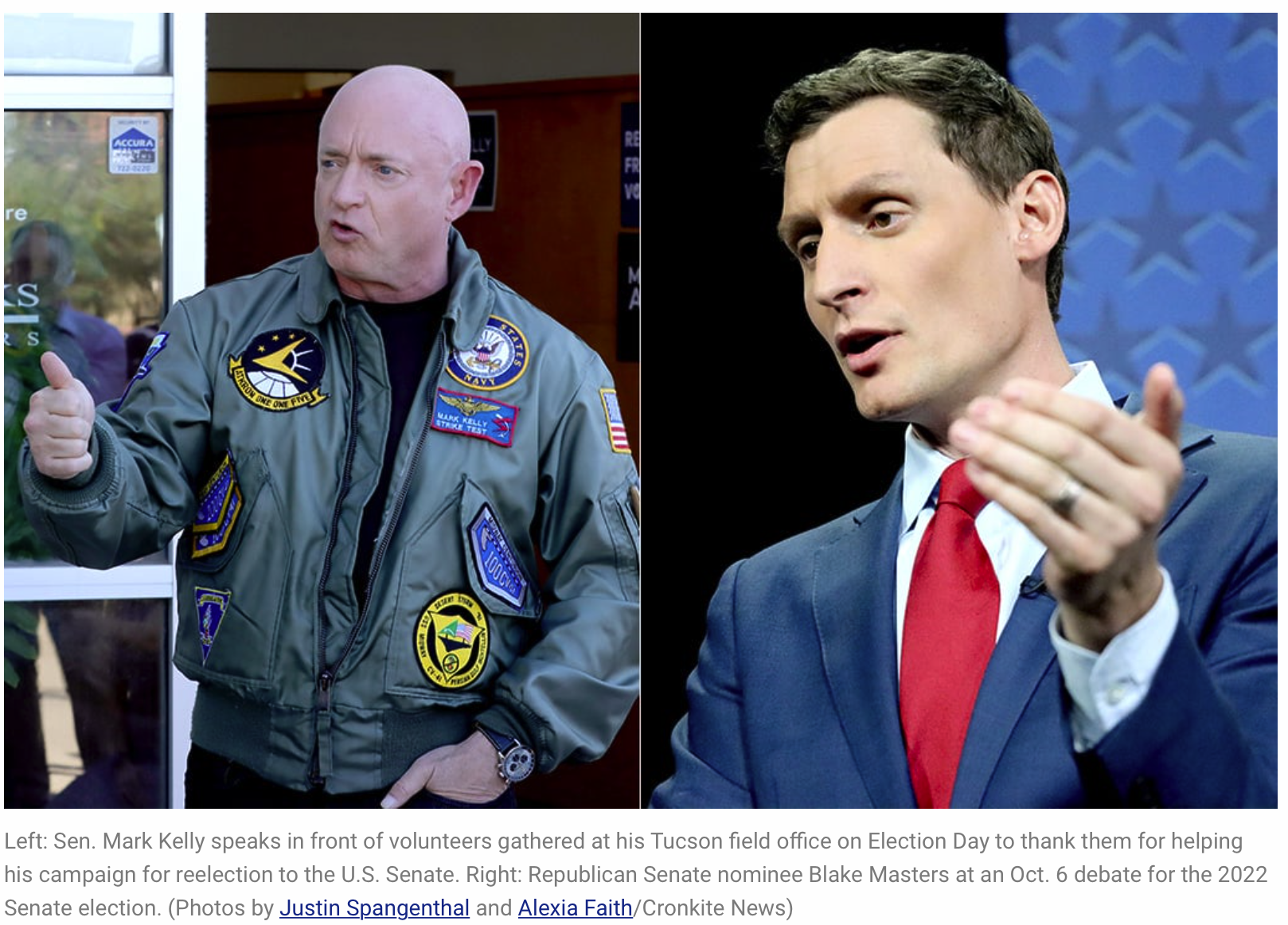Left: Sen. Mark Kelly speaks in front of volunteers gathered at his Tucson field office on Election Day to thank them for helping his campaign for reelection to the U.S. Senate. Right: Republican Senate nominee Blake Masters at an Oct. 6 debate for the 2022 Senate election. Photos by Justin Spangenthal and Alexia Faith || Cronkite News
By Tristan Richards and Fernanda Galan Martinez || Cronkite News
Incumbent Sen. Mark Kelly jumped out to an early lead Tuesday against Trump-backed Republican challenger Blake Masters in one of the most expensive and closely watched Senate races in the country.
With 57% of precincts reporting, Kelly led over Masters in unofficial results from the Arizona Secretary of State’s Office.
Kelly waited until past 11 p.m. before emerging to thank supporters, wife Gabby Giffords and astronaut brother Scott Kelly at his Tucson election night watch party. Saying that he was encouraged by the returns, he said he ran a grassroots campaign that garnered more than a million contributions, many of them less than $25.
Kelly said his campaign focused on telling the truth and seeking to unite Democrats, Republicans and Independents to find common ground.
Earlier in the day, Masters joined gubernatorial candidate Kari Lake, the Republican National Committee and the National Republican Senatorial Committee in requesting a court order extending polling hours because 60 voting centers in Maricopa County had tabulation issues. The motion was quickly denied by a Maricopa County Superior Court judge and polls closed as scheduled at 7 p.m.
Leading up to Election Day, polls showed Kelly with a razor-thin lead over Masters, well within the margin of error for the polls and too close to call. A Real Clear Politics average of polls showed Masters ahead for the first time Tuesday, by just 0.3%.
With the Senate split between Democrats and Republicans – Vice President Kamala Harris holds the tie-breaking vote for Democrats – Senate races in swing states like Arizona have been closely watched because they could tip control of the chamber to one party or the other.
The Arizona race has also been one of the most expensive. Kelly, elected in 2020 in a special election to fill out the term of the late Sen. John McCain, R-Ariz., has been a prodigious fundraiser. The $81.8 million he raised, according to his most recent filing with the Federal Election Commission, was second only to the $123.5 million raised by Sen. Raphael Warnock, D-Ga.
Those numbers dwarf the $12.2 million that Masters reported raising. But what he lacked in campaign funding, Masters made up for in support from the National Republican Senatorial Committee, Senate Minority Leader Mitch McConnell and billionaire tech entrepreneur Peter Thiel, who combined to spend almost $50 million to oppose Kelly.
Masters is a first-time candidate for office, but he was bolstered throughout the campaign by support from Thiel, his former boss who pumped millions into the Saving Arizona Political Action Committee.
That support helped Masters survive a crowded and well-funded GOP primary against businessman Jim Lamon, Arizona Attorney General Mark Brnovich, retired Arizona National Guard Adjutant Gen. Mick McGuire and Arizona Corporation Commission member Justin Olson. But what really pushed Masters over the top was the endorsement of former President Donald Trump.
Masters won the nomination with 40.2% of the primary vote and campaigned as an anti-establishment Republican, similar to Trump and Lake. He is a self-described “family man” and “visionary leader.”
After the bruising primary, however, he was short on cash and his campaign faltered, falling as much as 11 percentage points behind Kelly at some points in the summer.
But Masters, like many Republicans, gained ground as the summer went on and inflation worsened, and he was within striking distance by this month. His candidacy got a further boost last week when Libertarian nominee Marc J. Victor dropped out of the Senate race and endorsed Masters.
Analysts noted that Victor consistently polled in the low single digits, and it was unclear how many of his supporters would follow his lead and back Masters. His announcement also came after more than 1 million early ballots had already been returned. But experts said that it was still not good news for the Kelly campaign.
Kelly, a former Navy pilot and NASA astronaut, also was a first-time candidate when he won the office in 2020, edging U.S. Sen. Martha McSally, a Republican who had been appointed to the Senate by Arizona Gov. Doug Ducey.
Kelly has positioned himself as a moderate Democrat and “independent leader” who campaigned on a promise to represent all Arizonans, not just those who share his party affiliation. He criticized the Biden administration when it announced plans to end Title 42, a policy that let U.S. officials turn away migrants at the border as a COVID-19 preventive measure.
Despite his rhetoric, however, Kelly has voted with the Biden administration 95% of the time, according to FiveThirtyEight.
Kelly has bragged about the fact that most of his campaign funding has come from independent sources, with nearly $77 million contributed by individuals. Because of the national profile of the race, however, a good deal of that money has come from individuals outside Arizona.
More $10 million of Masters’ financing came from individuals, according to his FEC reports. Masters’ fundraising ranked 32nd among Senate campaigns.








